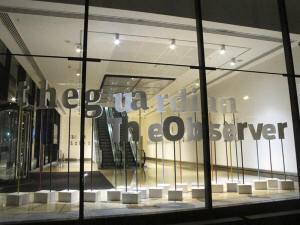Sale of UK's Observer, world's oldest Sunday newspaper and a bastion of
liberal values, is agreed
 Send a link to a friend
Send a link to a friend
 [December 07, 2024] By
PAN PYLAS [December 07, 2024] By
PAN PYLAS
LONDON (AP) — The sale of the Observer, the world's oldest Sunday
newspaper and a bastion of liberal values in Britain's media landscape,
was approved Friday despite two days of strike action from journalists
this week.
The Scott Trust, the owner of the Guardian Media Group, which includes
the Observer and its sister paper the Guardian, said the sale to
Tortoise Media is expected to be signed in the coming days.
The Scott Trust said it will invest in Tortoise Media, becoming a key
shareholder, and take a seat on both its editorial and commercial
boards.
Under the terms of the deal, Tortoise will invest 25 million pounds ($32
million) in the Observer, which was founded in 1791 and became part of
the Guardian Media Group in 1993, and has committed to continue its
Sunday print edition and build up its digital brand.
It has also committed to safeguarding journalistic freedom and the
editorial independence of the Observer, undertaking to honor the
“liberal values and journalistic standards” of the Scott Trust in its
editorial code.
Tortoise was launched in 2019 by James Harding, a former editor of the
London Times and director of news at the BBC, and the former U.S.
ambassador to London, Matthew Barzun.

Harding said the Observer name represents “the best of liberal,
pioneering journalism,” and promised readers that "we will do all we can
to live up to its history as a defender of human dignity and to give it
a new lease of life as a powerful, progressive voice in the world.”
Ole Jacob Sunde, who chairs the Scott Trust, said the Observer needed
“an ally to be sufficiently funded, long-term in nature and respect
editorial independence and liberal values.”

[to top of second column] |

A view of the offices of the Guardian and its sister paper, The
Observer, on Monday night, Aug. 19, 2013. (AP Photo/Raphael Satter,
File)
 Journalists at both the Guardian,
which publishes print editions between Monday and Saturday and has a
deep digital footprint around the world, and the Observer, have
protested the sale and went on a 48-hour strike on Wednesday and
Thursday. Though the Guardian is clearly the bigger brand,
especially in the digital space, the two newspapers had a very close
relationship, operating from the same building in London and sharing
resources.
“I recognize how unsettling this period has been for Observer staff
but we’re confident we have agreed the best possible way forward for
the title’s journalists, its readers and the future of both the
Observer and the Guardian," said Katharine Viner, editor-in-chief of
Guardian News & Media.
Members of the National Union of Journalists from both papers will
meet later Friday to consider next steps, its general
secretary-elect Laura Davison said.
“The timing of the decision, before the end of two extremely
well-supported days of action, is particularly shabby," she said.
Giao Pacey, a partner at media and entertainment law firm Simkins
LLP, said the Observer's new leadership will have to be careful in
safeguarding the value of the newspaper, which is intrinsically
linked to its brand, established over centuries.
“Once the sale is completed, the leadership team will need to strike
the right balance between preserving the legacy, culture and
integrity of the business while ensuring that it has sufficient
resources and support to thrive in a rapidly evolving market,” said
Pacey.
All contents © copyright 2024 Associated Press. All rights reserved |